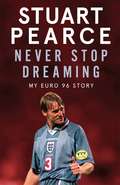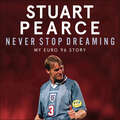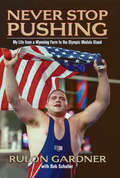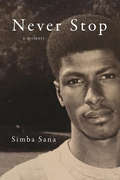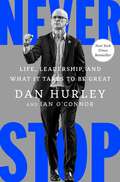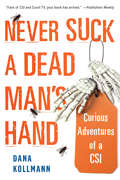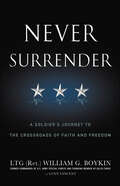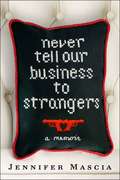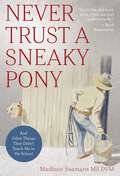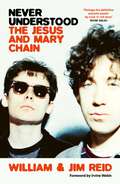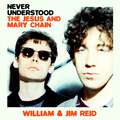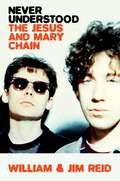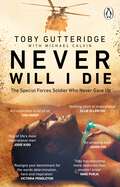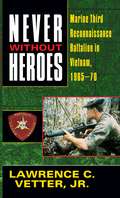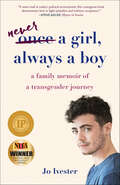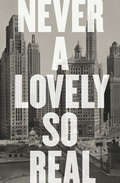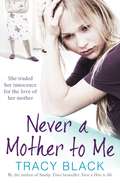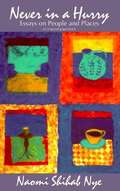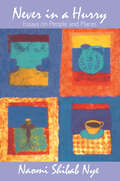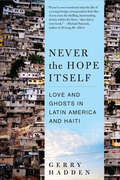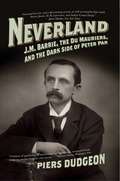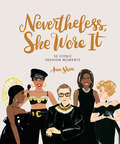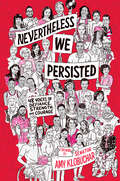- Table View
- List View
Never Stop Dreaming: My Euro 96 Story - SHORTLISTED FOR SPORTS ENTERTAINMENT BOOK OF THE YEAR 2021
by Stuart Pearce Oliver HoltStuart Pearce became the face of England's bid to win the 1996 European Championships when his maniacal explosion of joy and relief at scoring a penalty in the quarter-final shoot-out against Spain captured the mood of a nation.England did not win the tournament, but, against a backdrop of the Three Lions song that played from every pub, every bar, every car radio and every open window in that summer, it cemented the renaissance of the game in this country. Alongside his friendships with Paul Gascoigne and Gareth Southgate - including the time the trio were invited on stage by the Sex Pistols - the book details the semi-final against Germany, more heartbreak in the penalty shootout when Southgate missed England's sixth penalty and what the tournament meant to Pearce and to Southgate and to the rest of the country.It is a first-hand account of the summer when football came home for England fans, and when the country lost itself in the joy of a home tournament.
Never Stop Dreaming: My Euro 96 Story - SHORTLISTED FOR SPORTS ENTERTAINMENT BOOK OF THE YEAR 2021
by Stuart Pearce Oliver HoltA first-hand account of one of the most memorable summers of the 90s.Stuart Pearce became the face of England's bid to win the 1996 European Championships when his maniacal explosion of joy and relief at scoring a penalty in the quarter-final shoot-out against Spain captured the mood of a nation.England did not win the tournament, but, against a backdrop of the Three Lions song that played from every pub, every bar, every car radio and every open window in that summer, it cemented the renaissance of the game in this country. Alongside his friendships with Paul Gascoigne and Gareth Southgate - including the time the trio were invited on stage by the Sex Pistols - the book details the semi-final against Germany, more heartbreak in the penalty shootout when Southgate missed England's sixth penalty and what the tournament meant to Pearce and to Southgate and to the rest of the country.It is a first-hand account of the summer when football came home for England fans, and when the country lost itself in the joy of a home tournament. His memoir - heavy with the presence of his friend Southgate - is the perfect bridge to the excitement that will build and build as Euro 2020 descends on us and Southgate's England attempt to win their first major tournament since 1966.(P) 2020 Hodder & Stoughton Ltd
Never Stop Pushing: My Life from a Wyoming Farm to the Olympic Medals Stand
by Bob Schaller Rulon GardnerNever Stop Pushing is a motivational autobiography by Olympic Greco-Roman champion wrestler Rulon Gardner (Gold Medal, 2000; Bronze Medal, 2004). This inspiring memoir comes from one of the world's most remarkable athletes who achieved arguably the greatest upset in individual sports history when he defeated the Russian Alexander Karelin - three-time Olympic champ, undefeated and unscored upon for a decade before his match with Gardner - in the 2000 Gold Medal match. Rulon Gardner tells the story of his impoverished upbringing as one of nine children in a close-knit Mormon family on a farm in Wyoming, where in performing unceasing chores he developed tremendous strength at an early age. Gardner writes about his struggles in school made arduous by learning disabilities that have challenged him his whole life. Also, after winning his Gold Medal, we read how this champion survived a snowmobile accident that marooned him outdoors for eighteen hours in high country. Rulon Gardner recovered from this and went on to defend his Gold Medal at Athens in 2004-yet another comeback from this athlete who was supposed to simply fade away.
Never Stop: A Memoir
by Simba SanaA memoir from the cofounder of the nation&’s largest black-owned chain of bookstores. &“A candid testimony of struggle and achievement.&” —Kirkus Reviews Never Stop is the wrenching memoir of Simba Sana, the cofounder and former leader of Karibu Books, a major indie-bookselling phenomenon and perhaps the most successful black-owned company in the history of the book industry. In this memoir, Sana reveals how his experience with Karibu jumpstarted his lifelong journey to better understanding himself, human nature, faith, and American culture—which ultimately helped him develop the powerful personal philosophy that drives his life today. Born Bernard Sutton in Washington, DC, Sana grew up in the cycle of poverty and violence that dominated inner-city life in the seventies and eighties. Sana&’s academic success got him into college, where his life increasingly embodied the contradictions that plagued his youth. Committed to self-improvement and self-discipline, he grew into a successful businessman while becoming an impassioned Black Nationalist and Pan-Africanist. He lived the corporate life at Ernst & Young by day while leading radical consciousness-raising groups by night. Building Karibu became Sana&’s opportunity to bind the disparate elements of his life together. Ultimately, though, the paradoxes in his identity and his accumulated emotional wounds confounded his effort to overcome his business reversals, and everything Sana built—his marriage, family, and business—was lost in an incredibly brief period of time. Sana had to rebuild his life—and his identity—and set out to do so in a way that focused principally on the meaning and importance of love. &“Hands down one of the best explorations into the Black male psyche I&’ve ever read.&” —Essence
Never Stop: Life, Leadership, and What It Takes to Be Great
by Dan Hurley Ian O'ConnorNEW YORK TIMES BESTSELLER Dan Hurley is one of the most famous head coaches in America today—in any sport. He returned the UConn Huskies men&’s basketball team to their rightful place among the nation&’s elite, winning back-to-back NCAA Championships, and he did it with uncommon passion. His on-court eruptions, his face-offs with refs and even fans, are legendary.But behind all the winning and swagger is a story of intense, harrowing struggle. Son of a revered high school coach, younger brother of a college basketball icon, Hurley spent years fearing that he&’d just never measure up. He suffered through several bouts of anxiety and deep depressions. As a young player he was ridiculed, as a young coach he came up short. Many people would have given up. But through relentless will, and Jersey City grit, he reached the summit, becoming such a shining success that the Los Angeles Lakers came calling. For anyone needing a boost or a blast of inspiration, for anyone leading a team or wanting to up their game, for anyone chasing greatness, Hurley&’s story, told in his unique no-BS voice, is a must-read.
Never Suck A Dead Man's Hand: Curious Adventures Of A Csi (Crime Scene Ser.)
by Dana Kollmann&“Informative, witty . . . Kollmann delivers terse commentary and gory detail while puncturing common misconceptions about forensics.&” —Booklist Step past the flashing lights into the true scene of the crime with this frank, unflinching, and unforgettable account of life as a crime scene investigator. Whether explaining rigor mortis or the art of fingerprinting a stiff corpse on the side of the road, Dana Kollmann details her true, unvarnished experiences as a CSI for the Baltimore County Police Department. &“Riveting.&” —M. William Phelps, New York Times bestselling author of We Thought We Knew You Unlike the popular crime dramas proliferating on today&’s television networks, these forensic tales forgo glitz for grit to show what really goes on. Kollmann recounts stories that the cops and the CSI&’s usually leave in the field, bringing the sights, smells, and sounds of a crime scene alive as never before. &“Raw and real.&” —Connie Fletcher, author of Every Contact Leaves a Trace Unveiling the process and science of crime scene investigation in all its can&’t-tear-your-eyes-away fascination, Never Suck a Dead Man&’s Hand takes you into the strange world behind the yellow tape, offering a truly eye-opening perspective on the day-to-day life of a CSI. &“Gritty, witty, and heartfelt . . . a must-read.&” —Aphrodite Jones, New York Times bestselling author of A Perfect Husband
Never Surrender: A Soldier's Journey to the Crossroads of Faith and Freedom
by Lynn Vincent Jerry BoykinIn 1978, Jerry Boykin joined what would become the world's premier Special Operations unit, Delta Force. The only promise: "A medal and a body bag." What followed was a .50 caliber round in the chest and a life spent with America's elite forces bringing down warlords and war criminals, despots, and dictators. In Colombia, his task force hunted the notorious drug lord Pablo Escobar. In Panama, he helped capture the brutal dictator Manuel Noriega, liberating a nation. From Vietnam to Iran to Mogadishu, Lt. General Jerry Boykin's life reads like an action-adventure novel. Boykin's powerful story will keep you riveted as he reveals how his military duty worked in tandem with his faith to bring him through the bloody storms of foreign battle-and through the political firestorm that ambushed him in his own country.
Never Tell Our Business to Strangers: A Memoir
by Jennifer MasciaAfter years of crisscrossing the country, Mascia's mother finally revealed that Jennifer's early life had been spent on the lam. What had her parents done? The truth was more surprising than Mascia ever imagined.
Never Trust a Sneaky Pony
by DVM MS Madison SeamansJames Herriot meets Jeff Foxworthy in the real-life adventures of a traveling horse doctor.Climb into the truck alongside large animal vet Dr. Madison Seamans and race to the aid of horses with wounds, stomach aches, allergies, and bizarre behaviors, as well as those in severe physical distress. Quite by accident, you'll find yourself familiar with and understanding common equine medical problems and how they are diagnosed and treated, all while marveling at the remarkable situations a country veterinarian can find himself in. Playful yet serious, honest yet tongue-in-cheek, this wonderfully written book is an up-close look at a well-lived rural life that is about as authentic as America gets. No one who cares a whit for the animal kingdom, and the humans who dare enter it, will be disappointed.
Never Trust a Thin Cook and Other Lessons from Italy’s Culinary Capital
by Eric DregniThe food-obsessed chronicle of an American&’s three years in Italy—now available in paperback I simply want to live in the place with the best food in the world. This dream led Eric Dregni to Italy, first to Milan and eventually to a small, fog-covered town to the north: Modena, the birthplace of balsamic vinegar, Ferrari, and Luciano Pavarotti. Never Trust a Thin Cook is a classic American abroad tale, brimming with adventures both expected and unexpected, awkward social moments, and most important, very good food. Parmesan thieves. Tortellini based on the shape of Venus&’s navel. Infiltrating the secret world of the balsamic vinegar elite. Life in Modena is a long way from the Leaning Tower of Pizza (the south Minneapolis pizzeria where Eric and his girlfriend and fellow traveler Katy first met), and while some Italians are impressed that &“Minnesota&” sounds like &“minestrone,&” they are soon learning what it means to live in a country where the word &“safe&” doesn&’t actually exist—only &“less dangerous.&” Thankfully, another meal is always waiting, and Dregni revels in uncorking the secrets of Italian cuisine, such as how to guzzle espresso &“corrected&” with grappa and learning that mold really does make a good salami great. What begins as a gastronomical quest soon becomes a revealing, authentic portrait of how Italians live and a hilarious demonstration of how American and Italian cultures differ. In Never Trust a Thin Cook, Eric Dregni dishes up the sometimes wild experiences of living abroad alongside the simple pleasures of Italian culture in perfect, complementary portions.
Never Understood: The Jesus and Mary Chain
by William Reid Jim ReidFor 5 years after they'd swapped sought-after apprenticeships for life on the dole, brothers William and Jim Reid sat up till the early hours in the front room of their parents' East Kilbride council house, plotting their path to world domination over endless cups of tea, with the music turned down low so as not to wake their sleeping sister. They knew they couldn't play in the same band because they'd argue too much, so they'd describe their dream ensembles to each other until finally they realised that these two perfect bands were actually the same band, and the name of that band was The Jesus and Mary Chain. The rest was not silence, and picking up those conversations again more than 40 years later, William and Jim tell the full story of one of Britain's greatest guitar bands for the very first time - a wildly funny and improbably moving chronicle of brotherly strife, feedback, riots, drug and alcohol addiction, eternal outsiders and extreme shyness, that also somehow manages to be a love letter to the Scottish working-class family.
Never Understood: The Jesus and Mary Chain
by William Reid Jim ReidFor 5 years after they'd swapped sought-after apprenticeships for life on the dole, brothers William and Jim Reid sat up till the early hours in the front room of their parents' East Kilbride council house, plotting their path to world domination over endless cups of tea, with the music turned down low so as not to wake their sleeping sister. They knew they couldn't play in the same band because they'd argue too much, so they'd describe their dream ensembles to each other until finally they realised that these two perfect bands were actually the same band, and the name of that band was The Jesus and Mary Chain. The rest was not silence, and picking up those conversations again more than 40 years later, William and Jim tell the full story of one of Britain's greatest guitar bands for the very first time - a wildly funny and improbably moving chronicle of brotherly strife, feedback, riots, drug and alcohol addiction, eternal outsiders and extreme shyness, that also somehow manages to be a love letter to the Scottish working-class family.
Never Understood: The Jesus and Mary Chain
by William Reid Jim ReidWilliam and Jim Reid, brothers and founding members of The Jesus and Mary Chain—a band that bridged the gap between the punk explosion and the emergence of grunge and Britpop—chronicle the chaos, confusion, and stories behind their music. For five years after they&’d swapped sought-after apprenticeships for life on the dole, brothers William and Jim Reid sat up till the early hours in the front room of their parents&’ East Kilbride council house, plotting their path to world domination over endless cups of tea, with the music turned down low so as not to wake their sleeping sister. They knew they couldn&’t play in the same band because they&’d argue too much, so they&’d describe their dream ensembles to each other until finally they realized that these two perfect bands were actually the same band. The name of that band was The Jesus and Mary Chain. The rest was not silence, and picking up those conversations again more than forty years later, William and Jim tell the full story of one of Britain&’s greatest guitar bands for the very first time – a wildly funny and improbably moving chronicle of brotherly strife, feedback, riots, drug and alcohol addiction, eternal outsiders and extreme shyness, that also somehow manages to be a love letter to the Scottish working-class family.
Never Will I Die: The inspiring Special Forces soldier who cheated death and learned to live again
by Michael Calvin Toby GutteridgeThere's no pain, no theatrical agony. No screaming, no shouting. The kill shot is catastrophic and conclusive. I slump silently on to my knees and topple forward, head first, into the dirt. The lads have seen enough death to assume mine is instantaneous. The lights are out. That's him gone.Toby Gutteridge was only 24 when he was shot through the neck while operating behind enemy lines in Afghanistan. He survived despite not breathing for at least 20 minutes. Back in the UK, doctors recommended that his life support machine be switched off, but with the defiant spirit that would define his recovery, Toby pulled through.Now quadriplegic, capable of movement only with his head, Toby has rebuilt his life. His is an extraordinary story of survival against overwhelming odds, and of the power of the human spirit to overcome extreme adversity. Brutally honest and authentic, he builds a compelling picture of the type of person produced by the Special Forces system, and tells of how one split second changed the course of his life forever.Powerful and inspiring, Never Will I Die is a universal story about our search for purpose, and explores what extreme experience teaches us about what truly matters.
Never Without Heroes: Marine Third Reconnaissance Battalion in Vietnam, 1965-70
by Lawrence C. Vetter Jr.FOUR CONGRESSIONAL MEDALS OF HONOR,THIRTEEN NAVAL CROSSES,SEVENTY-TWO SILVER STARS . . .In four and a half years in Vietnam, the Marines of the Third Reconnaissance Battalion repeatedly penetrated North Vietnamese and Vietcong sanctuaries by foot and by helicopter to find enemy forces, learn the enemy's intentions, and, when possible, bring deadly fire down on his head. Heavily armed, well-camouflaged teams of six and eight men daily exposed themselves to overwhelming enemy forces so that other Marines would have the information necessary to fight the war.It's all here: grueling, tense, and deadly recon patrols; insertions directly into NVA basecamps; last-stand defenses in the wreckage of downed helicopters; pursuit by superior North Vietnamese forces; agonizing deaths of men who valiantly put their lives on the line.NEVER WITHOUT HEROES is the first book to recount the story of a Marine reconnaissance battalion in Vietnam from the day of its arrival to its withdrawal. In Vietnam, Larry Vetter served as a platoon leader in Third Recon Battalion. He supplements his own recollections with Marine Corps records, exhaustive interviews with veterans, and correspondence to capture the bravery, and self-sacrifice of war.From the Paperback edition.
Never a Girl, Always a Boy: A Family Memoir of a Transgender Journey
by Jo IvesterJeremy Ivester is a transgender man. Thirty years ago, his parents welcomed him into the world as what they thought was their daughter. As a child, he preferred the toys and games our society views as masculine. He kept his hair short and wore boys’ clothing. They called him a tomboy. That’s what he called himself. By high school, when he showed no interest in flirting, his parents thought he might be lesbian. At twenty, he wondered if he was asexual. At twenty-three, he surgically removed his breasts. A year later, he began taking the hormones that would lower his voice and give him a beard—and he announced his new name and pronouns. Never a Girl, Always a Boy is Jeremy’s journey from childhood through coming out as transgender and eventually emerging as an advocate for the transgender community. This is not only Jeremy’s story but also that of his family, told from multiple perspectives—those of the siblings who struggled to understand the brother they once saw as a sister, and of the parents who ultimately joined him in the battle against discrimination. This is a story of acceptance in a world not quite ready to accept.
Never a Lovely So Real: The Life And Work Of Nelson Algren
by Colin AsherThis definitive biography reclaims Nelson Algren as a towering literary figure and finally unravels the enigma of his disappearance from American letters. For a time, Nelson Algren was America’s most famous author, lauded by the likes of Richard Wright and Ernest Hemingway. Millions bought his books. Algren’s third novel, The Man with the Golden Arm, won the first National Book Award, and Frank Sinatra starred in the movie. But despite Algren’s talent, he abandoned fiction and fell into obscurity. The cause of his decline was never clear. Some said he drank his talent away; others cited writer’s block. The truth, hidden in the pages of his books, is far more complicated and tragic. Now, almost forty years after Algren’s death, Colin Asher finally captures the full, novelistic story of his life in a magisterial biography set against mid-twentieth-century American politics and culture. Drawing from interviews, archival correspondence, and the most complete version of Algren’s 886-page FBI file ever released, Colin Asher portrays Algren as a dramatic iconoclast. A member of the Communist Party in the 1930s, Algren used his writing to humanize Chicago’s underclass, while excoriating the conservative radicalism of the McCarthy era. Asher traces Algren’s development as a thinker, his close friendship and falling out with Richard Wright, and his famous affair with Simone de Beauvoir. Most intriguingly, Asher uncovers the true cause of Algren’s artistic exile: a reckless creative decision that led to increased FBI scrutiny and may have caused a mental breakdown. In his second act, Algren was a vexing figure who hid behind a cynical facade. He called himself a “journalist” and a “loser,” though many still considered him one of the greatest living American authors. An inspiration to writers such as Hunter S. Thompson, Martha Gellhorn, Jimmy Breslin, Betty Friedan, Cormac McCarthy, Don DeLillo, Russell Banks, and Thomas Pynchon, Algren nevertheless struggled to achieve recognition, and died just as his career was on the verge of experiencing a renaissance. Never a Lovely So Real offers an exquisitely detailed, engrossing portrait of a master who, as esteemed literary critic Maxwell Geismar wrote, was capable of suggesting “the whole contour of a human life in a few terse pages.”
Never a Mother to Me
by Tracy BlackIn her first book, Never a Hero to Me, Tracy Black told the horrific story of how her father, a respected Army man, was in fact a heartless paedophile who convinced Tracy that her mother's health was completely dependent on her willingness to be abused. In her new book, Tracy continues her shocking story by telling how her mother closed her eyes to the cruelty, treating her little girl with cold indifference. Heartbreakingly Tracy traded her innocence for the love of her mother - love which was never given, no matter how much she suffered. As Tracy approached adulthood, she risked being trapped in damaging sexual relationships. But after years of struggle she found the courage to break out of her past and turn her life around.
Never at Rest
by Richard S. WestfallThis richly detailed 1981 biography captures both the personal life and the scientific career of Isaac Newton, presenting a fully rounded picture of Newton the man, the scientist, the philosopher, the theologian, and the public figure. Professor Westfall treats all aspects of Newton's career, but his account centres on a full description of Newton's achievements in science. Thus the core of the work describes the development of the calculus, the experimentation that altered the direction of the science of optics, and especially the investigations in celestial dynamics that led to the law of universal gravitation.
Never in a Hurry: Essays on People and Places
by Naomi Shihab NyeAn Arab-American woman's essays about many topics including potluck suppers with could-be relatives, junkets to exotic locales, and the importance of strangers in our lives.
Never in a Hurry: Essays on People and Places
by Naomi Shihab NyeFrom the acclaimed poet and National Book Award finalist, “a sparkling book of travel and childhood: born on the bridge between two cultures” (Paulette Jiles, New York Times–bestselling author).In Never in a Hurry the poet Naomi Shihab Nye resist the American inclination to “leave toward places when we barely had time enough to get there.” Instead she travels the world at an observant pace, talking to strangers and introducing readers to an endearing assemblage of eccentric neighbors, Filipina faith healers, dry-cleaning proprietors, and other quirky characters.A Palestinian-American who lives in a Mexican-American neighborhood, Nye speaks for the mix of people and places that can be called the “American Experience.” From St. Louis, the symbolic “Gateway to the West,” she embarks on a westward migration to examine America, past and present, and to glimpse into the lives of its latest outsiders—illegal immigrants from Mexico and troubled inner-city children.In other essays Nye ventures beyond North America’s bounds, telling of a year in her childhood spent in Palestine and of an adulthood filled with cross-cultural quests. Whether recounting the purchase of a car on the island of Oahu or a camel-back ride through India’s Thar Desert, Nye writes in wry, refreshing tones about themes that transcend borders and about the journey that remains the greatest of all—the journey from outside to in as the world enters each one of us, as we learn to see.“The generous gift of a writer at the top of her form, a book jammed with vivid sights and pungent tastes and wonderful stories.” —Marion Winik, author of Above Us Only Sky
Never the Hope Itself: Love and Ghosts in Latin America and Haiti
by Gerry HaddenA former NPR correspondent takes you into his own ghost-filled life as he reports on a region in turmoil. Gerry Hadden was training to become a Buddhist monk when opportunity came knocking: the offer of a dream job as NPR’s correspondent for Latin America. Arriving in Mexico in 2000 during the nation’s first democratic transition of power, he witnesses both hope and uncertainty. But after 9/11, he finds himself documenting overlooked yet extraordinary events in a forgotten political landscape. As he reports on Colombia’s drug wars, Guatemala’s deleterious emigration, and Haiti’s bloody rebellion, Hadden must also make a home for himself in Mexico City, coming to terms with its ghosts and chasing down the love of his life, in a riveting narrative that reveals the human heart at the center of international affairs.
Neverland: J. M. Barrie, the Du Mauriers, and the Dark Side of Peter Pan
by Piers DudgeonThe untold story behind Peter Pan: The shocking account of J. M. Barrie's abuse and exploitation of the du Maurier family. In his revelatory Neverland, Piers Dudgeon tells the tragic story of J. M. Barrie and the Du Maurier family. Driven by a need to fill the vacuum left by sexual impotence, Barrie sought out George du Maurier, Daphne du Maurier's grandfather (author of the famed Trilby), who specialized in hypnosis. Barrie's fascination and obsession with the Du Maurier family is a shocking study of greed and psychological abuse, as we observe Barrie as he applies these lessons in mind control to captivate George's daughter Sylvia, his son Gerald, as well as their children--who became the inspiration for the Darling family in Barrie's immortal Peter Pan. Barrie later altered Sylvia's will after her death so that he could become the boys' legal guardian, while pushing several members of the family to nervous breakdown and suicide. Barrie's compulsion to dominate was so apparent to those around him that D. H. Lawrence once wrote: J. M Barrie has a fatal touch for those he loves. They die.
Nevertheless, She Wore It: 50 Iconic Fashion Moments (Nevertheless Ser.)
by Ann ShenFrom the creator of the bestselling Bad Girls Throughout History!Celebrated illustrator and author Ann Shen shares her striking study of history's most iconic styles, and the women who changed the world while wearing them.From the revolutionary bikini to the presidential pantsuit, this book explores 50 fashions through bold paintings and insightful anecdotes that empower readers to make their own fashion statements.• Demonstrates the power of fashion as a political and cultural tool for making change• Brilliantly illustrated with Ann's signature art style• Filled with radical clothing choices that defined their timeLooks include the Flapper Dress, the unofficial outfit of women's independence in the 1920s; the Afro, worn as a symbol of black beauty, power, and pride; the Cone Bra, donned by Madonna in her 1989 power anthem "Express Yourself"; and the Dissent Collar, Ruth Bader Ginsburg's famous signifier for when she disagrees with the majority.With stunning and vibrant illustrations, this is a treasure for anyone who wants to defy style norms and rewrite the rules. • An insightful look at the intersection of fashion statements and historical female power• Perfect for fans of Ann Shen, as well as anyone who loves fashion, feminism, and political consciousness• You'll love this book if you love books like Women In Science: 50 Fearless Pioneers Who Changed The World by Rachel Ignotofsky; Strong Is the New Pretty: A Celebration Of Girls Being Themselves by Kate T. Parker; and Women Who Dared: 52 Stories Of Fearless Daredevils, Adventurers, And Rebels by Linda Skeers.
Nevertheless, We Persisted: 48 Voices of Defiance, Strength, and Courage
by Amy KlobucharA powerful collection of essays from actors, activists, athletes, politicians, musicians, writers, and teens, including Senator Amy Klobuchar, actress Alia Shawkat, actor Maulik Pancholy, poet Azure Antoinette, teen activist Gavin Grimm, and many, many more, each writing about a time in their youth when they were held back because of their race, gender, or sexual identity--but persisted. <P><P> "Aren't you a terrorist?" "There are no roles for people who look like you." "That's a sin." "No girls allowed." They've heard it all. Actress Alia Shawkat reflects on all the parts she was told she was too "ethnic" to play. Former NFL player Wade Davis recalls his bullying of gay classmates in an attempt to hide his own sexuality. Teen Gavin Grimm shares the story that led to the infamous "bathroom bill," and how he's fighting it. Holocaust survivor Fanny Starr tells of her harrowing time in Aushwitz, where she watched her family disappear, one by one. <P><P> What made them rise up through the hate? What made them overcome the obstacles of their childhood to achieve extraordinary success? How did they break out of society's limited view of who they are and find their way to the beautiful and hard-won lives they live today? With a foreword by Minnesota senator and up-and-coming Democratic party leader Amy Klobuchar, these essays share deeply personal stories of resilience, faith, love, and, yes, persistence.
